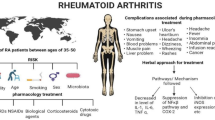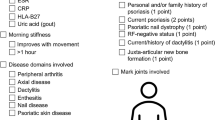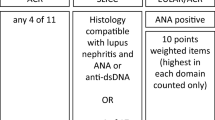Abstract
Serum connective tissue growth factor (CTGF) is reported to be a potential biomarker for the diagnosis of rheumatoid arthritis (RA). Our study aimed to investigate the prevalence of serum CTGF and the association with the clinical features in RA patients. Serum samples were obtained from 180 patients with RA, 168 patients with other rheumatic diseases, including 43 systemic lupus erythematosus (SLE), 34 osteoarthritis (OA), 17 primary Sjögren’s syndrome (pSS), 20 ankylosing spondylitis (AS), 23 psoriatic arthritis (PsA), 6 reactive arthritis (ReA), 20 systemic sclerosis (SSc), and 5 systemic vasculitis (SV), and 64 healthy individuals. The clinical and laboratory data of patients with RA were collected. Levels of CTGF in serum were measured by enzyme linked immunosorbent assay (ELISA). Associations between CTGF and the clinical features of RA were analyzed. The positivity of serum CTGF among RA patients (33.89%) was significantly higher than those of SLE (9.3%), OA (0%), AS (0%), pSS (0%), PsA (0%), ReA (0%), SSc (5%), SV (0%), and healthy controls (4.69%) (p < 0.0001). The mean concentration of serum CTGF in RA was also significantly higher than those in other rheumatic diseases and healthy controls (p < 0.001). At the cut-off value of 263.30 pg/ml, the sensitivity, specificity, positive predictive value, and negative predictive value of serum CTGF for RA were 33.89%, 96.55%, 88.41%, and 55.45%, respectively. Anti-cyclic citrullinated peptide (anti-CCP) antibody (p < 0.001), rheumatoid factor (RF) (p < 0.001), IgG (p = 0.025), and IgM (p = 0.004) in CTGF-positive patients were higher than those in CTGF-negative patients. Besides, the positive rate of serum CTGF was significantly higher in RA patients with interstitial lung disease (ILD) (53.1%, 26/49) than RA-non-ILD patients (26.7%, 35/131, p = 0.003). Serum CTGF, as a novel biomarker, has certain diagnostic value for RA. Further studies are necessary to get more knowledge for the diagnostic performance of CTGF in RA.
Key points
• Serum CTGF, as a novel biomarker, has certain diagnostic value for RA, the sensitivity, specificity, positive predictive value, and negative predictive value of which were 33.89%, 96.55%, 88.41%, and 55.45%, respectively.
• Serum CTGF was more common to be positive in RA-ILD patients (53.1%, 26/49) than RA-non-ILD patients (26.7%, 35/131, p = 0.003).


Similar content being viewed by others
References
Aletaha D, Neogi T, Silman AJ, Funovits J, Felson DT, Bingham CO 3rd, Birnbaum NS, Burmester GR, Bykerk VP, Cohen MD, Combe B, Costenbader KH, Dougados M, Emery P, Ferraccioli G, Hazes JM, Hobbs K, Huizinga TW, Kavanaugh A, Kay J, Kvien TK, Laing T, Mease P, Menard HA, Moreland LW, Naden RL, Pincus T, Smolen JS, Stanislawska-Biernat E, Symmons D, Tak PP, Upchurch KS, Vencovsky J, Wolfe F, Hawker G (2010) 2010 rheumatoid arthritis classification criteria: an American College of Rheumatology/European League Against Rheumatism collaborative initiative. Ann Rheum Dis 69(9):1580–1588. https://doi.org/10.1136/ard.2010.138461
Zhao J, Li ZG (2018) The challenges of early diagnosis and therapeutic prediction in rheumatoid arthritis. Int J Rheum Dis 21(12):2059–2062. https://doi.org/10.1111/1756-185X.13459
Ramazani Y, Knops N, Elmonem MA, Nguyen TQ, Arcolino FO, van den Heuvel L, Levtchenko E, Kuypers D, Goldschmeding R (2018) Connective tissue growth factor (CTGF) from basics to clinics. Matrix Biol 68-69:44–66. https://doi.org/10.1016/j.matbio.2018.03.007
Nozawa K, Fujishiro M, Kawasaki M, Kaneko H, Iwabuchi K, Yanagida M, Suzuki F, Miyazawa K, Takasaki Y, Ogawa H, Takamori K, Sekigawa I (2009) Connective tissue growth factor promotes articular damage by increased osteoclastogenesis in patients with rheumatoid arthritis. Arthritis Res Ther 11(6):R174. https://doi.org/10.1186/ar2863
Ding S, Duan H, Fang F, Shen H, Xiao W (2016) CTGF promotes articular damage by increased proliferation of fibroblast-like synoviocytes in rheumatoid arthritis. Scand J Rheumatol 45(4):282–287. https://doi.org/10.3109/03009742.2015.1092581
Yang X, Lin K, Ni S, Wang J, Tian Q, Chen H, Brown MA, Zheng K, Zhai W, Sun L, Jin S, Wang J (2017) Serum connective tissue growth factor is a highly discriminatory biomarker for the diagnosis of rheumatoid arthritis. Arthritis Res Ther 19(1):257. https://doi.org/10.1186/s13075-017-1463-1
Zhao J, Su Y, Li R, Ye H, Zou Q, Fang Y, Liu H, Li X, Guo J, Bi L, Gu F, Sun L, Mei Y, Zhang Z, Chen L, Zhu P, Li G, Zhang Z, Leng X, Zhao Y, Jiang L, Zou H, Zhao Y, Liu Y, Li L, Wang H, Liu X, Li Z (2014) Classification criteria of early rheumatoid arthritis and validation of its performance in a multi-centre cohort. Clin Exp Rheumatol 32(5):667–673
Travis WD, Costabel U, Hansell DM, King TE Jr, Lynch DA, Nicholson AG, Ryerson CJ, Ryu JH, Selman M, Wells AU, Behr J, Bouros D, Brown KK, Colby TV, Collard HR, Cordeiro CR, Cottin V, Crestani B, Drent M, Dudden RF, Egan J, Flaherty K, Hogaboam C, Inoue Y, Johkoh T, Kim DS, Kitaichi M, Loyd J, Martinez FJ, Myers J, Protzko S, Raghu G, Richeldi L, Sverzellati N, Swigris J, Valeyre D, Pneumonias AECoII (2013) An official American Thoracic Society/European Respiratory Society statement: update of the international multidisciplinary classification of the idiopathic interstitial pneumonias. Am J Respir Crit Care Med 188(6):733–748. https://doi.org/10.1164/rccm.201308-1483ST
Conigliaro P, Chimenti MS, Triggianese P, Sunzini F, Novelli L, Perricone C, Perricone R (2016) Autoantibodies in inflammatory arthritis. Autoimmun Rev 15(7):673–683. https://doi.org/10.1016/j.autrev.2016.03.003
Wang Z, Qiu Y, Lu J, Wu N (2013) Connective tissue growth factor promotes interleukin-1beta-mediated synovial inflammation in knee osteoarthritis. Mol Med Rep 8(3):877–882. https://doi.org/10.3892/mmr.2013.1570
Liu SC, Hsu CJ, Chen HT, Tsou HK, Chuang SM, Tang CH (2012) CTGF increases IL-6 expression in human synovial fibroblasts through integrin-dependent signaling pathway. PLoS One 7(12):e51097. https://doi.org/10.1371/journal.pone.0051097
Nozawa K, Fujishiro M, Takasaki Y, Sekigawa I (2014) Inhibition of rheumatoid arthritis by blocking connective tissue growth factor. World J Orthop 5(5):653–659. https://doi.org/10.5312/wjo.v5.i5.653
Wei JL, Fu W, Hettinghouse A, He WJ, Lipson KE, Liu CJ (2018) Role of ADAMTS-12 in protecting against inflammatory arthritis in mice by interacting with and inactivating proinflammatory connective tissue growth factor. Arthritis Rheumatol (Hoboken, NJ) 70(11):1745–1756. https://doi.org/10.1002/art.40552
Nozawa K, Fujishiro M, Kawasaki M, Yamaguchi A, Ikeda K, Morimoto S, Iwabuchi K, Yanagida M, Ichinose S, Morioka M, Ogawa H, Takamori K, Takasaki Y, Sekigawa I (2013) Inhibition of connective tissue growth factor ameliorates disease in a murine model of rheumatoid arthritis. Arthritis Rheum 65(6):1477–1486. https://doi.org/10.1002/art.37902
Miyashita T, Morimoto S, Fujishiro M, Hayakawa K, Suzuki S, Ikeda K, Miyazawa K, Morioka M, Takamori K, Ogawa H, Sekigawa I, Takasaki Y (2016) Inhibition of each module of connective tissue growth factor as a potential therapeutic target for rheumatoid arthritis. Autoimmunity 49(2):109–114. https://doi.org/10.3109/08916934.2015.1113405
Kono M, Nakamura Y, Suda T, Kato M, Kaida Y, Hashimoto D, Inui N, Hamada E, Miyazaki O, Kurashita S, Fukamachi I, Endo K, Ng PS, Takehara K, Nakamura H, Maekawa M, Chida K (2011) Plasma CCN2 (connective tissue growth factor; CTGF) is a potential biomarker in idiopathic pulmonary fibrosis (IPF). Clin Chim Acta 412(23–24):2211–2215. https://doi.org/10.1016/j.cca.2011.08.008
Saito S, Alkhatib A, Kolls JK, Kondoh Y, Lasky JA (2019) Pharmacotherapy and adjunctive treatment for idiopathic pulmonary fibrosis (IPF). J Thorac Dis 11(Suppl 14):S1740–S1754. https://doi.org/10.21037/jtd.2019.04.62
Funding
This work was supported by the National Natural Science Foundation of China (No.81571573).
Author information
Authors and Affiliations
Corresponding author
Ethics declarations
Disclosures
None.
Additional information
Publisher’s note
Springer Nature remains neutral with regard to jurisdictional claims in published maps and institutional affiliations.
Rights and permissions
About this article
Cite this article
Ren, J., Sun, L., Sun, X. et al. Diagnostic value of serum connective tissue growth factor in rheumatoid arthritis. Clin Rheumatol 40, 2203–2209 (2021). https://doi.org/10.1007/s10067-020-05566-7
Received:
Revised:
Accepted:
Published:
Issue Date:
DOI: https://doi.org/10.1007/s10067-020-05566-7




